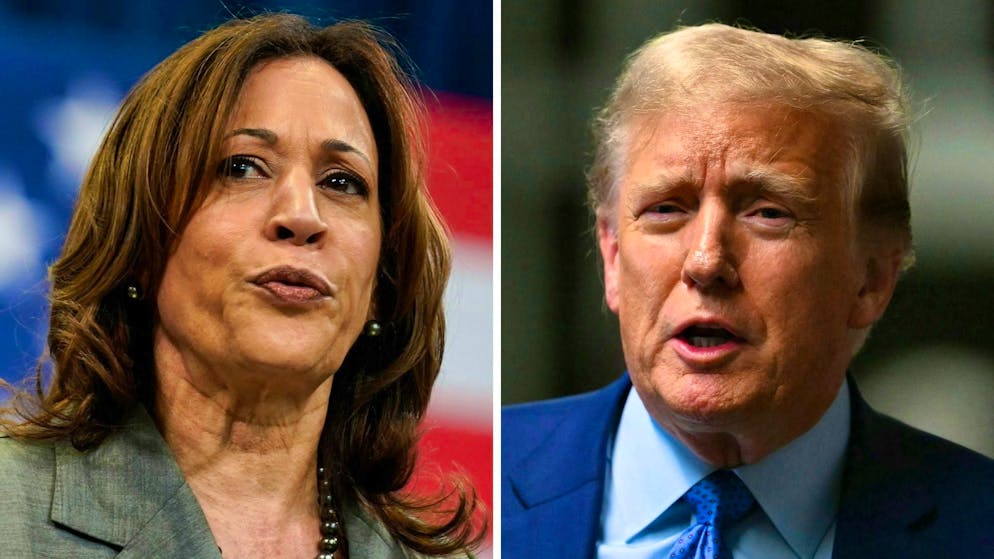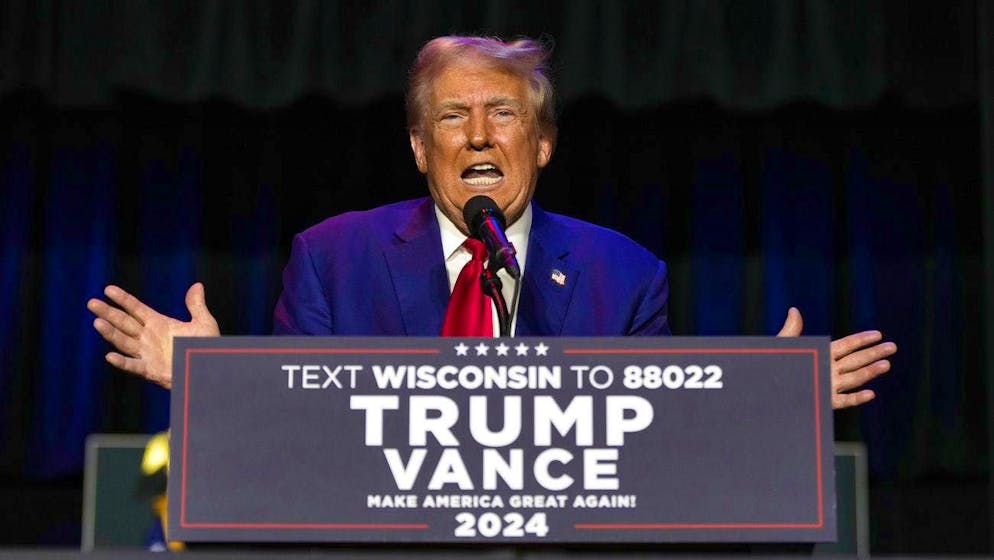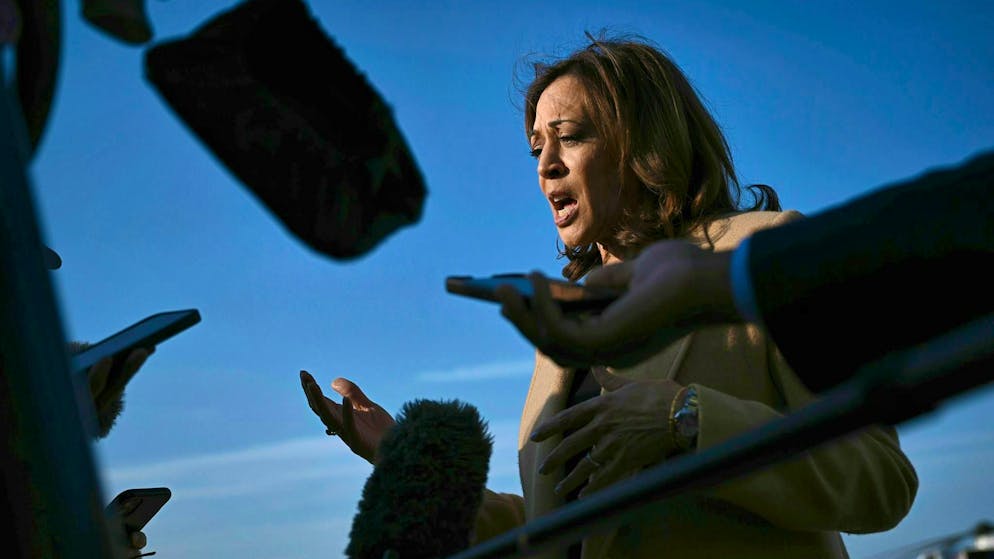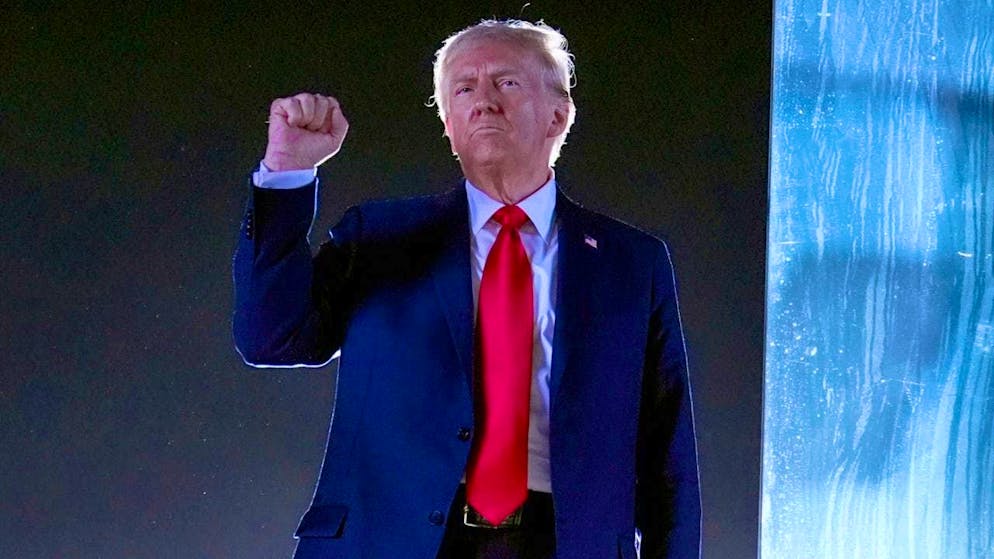Radicalization in the US election campaign Trump's statements are becoming increasingly blatant - and achieving their goal
Lea Oetiker
15.10.2024
The US election campaign has entered the hot phase. Trump is increasingly scoring points with extreme rhetoric and fear-mongering: polls show an increasingly clear neck-and-neck race.
No time? blue News summarizes for you
- For Kamala Harris and Donald Trump, the election campaign is in full swing.
- The two politicians are touring the swing states in particular to convince the last Americans of their cause.
- It is striking: Trump's speeches are becoming more and more extreme. And he seems to be succeeding.
On November 5, Americans will vote: will Kamala Harris or Donald Trump become President of the United States?
For the candidates, it is now the final spurt in the election campaign: the two are touring the swing states in particular to convince the last undecided Americans of their cause. Swing states are states in which the two parties were almost evenly matched in the last election.
It is striking: Trump is becoming increasingly radical in his speeches and slogans, according to a computer analysis by theNew York Times, among others. The result: the average length of his speeches at rallies rose from 45 minutes (2016) to 82 minutes (2024).

The use of terms like "always" and "never" increased by 13 percent. Negative words are now used 32 percent more often than positive ones, compared to 21 percent in 2016. The frequency of swear words increased by 69 percent.
Trump incites hatred against migrants
Trump's stance has become significantly tougher, especially when it comes to immigration: he repeatedly portrays refugees as dangerous and insults them as "criminals" and "rapists".
Recently again: "You know, a murderer, I think it's in the genes," Trump said in an interview. "And we have a lot of bad genes in our country right now." The US government has let hundreds of thousands of people into the country who are criminals, he said.
Trump said this after he falsely claimed in the TV debate that immigrants from Haiti living legally in the USA were eating pets in Springfield, Ohio.

At a rally in Arizona last Sunday, he then claimed that - should Harris be elected - "the whole country would turn into a migrant camp". And in the same appearance, he called for the death penalty for criminal immigrants who kill US citizens.
Two days earlier, in Colorado, he had again vowed to "launch the largest deportation operation in the history of the United States" and promised: "We will close the border. We will stop the invasion of illegals into our country. We will defend our territory. We will not be conquered."
Chaos caused by "radical left-wing lunatics"
In an interview - which was broadcast on Fox News on Sunday - the 78-year-old warned of possible chaos caused by "radical left-wing lunatics" surrounding the US election.
He also spoke of the "enemy within", against whom military action would have to be taken if necessary. He was asked whether he expected chaos on election day: Trump said that he did not expect this from his supporters. When asked about "agitators" from abroad, Trump said: "I think the bigger problem is the enemy within."
Trump defenders will say he was "just joking" in his new interview when he talked about sending on the military to "handle" the left, but note that this is a not a new Trump position. A few links below. pic.twitter.com/6ffIVl5SfI
— Orin Kerr (@OrinKerr) October 14, 2024
External Content
This content comes from external providers such as YouTube, Tiktok or Facebook. Please enable “Swisscom Third Party Advertising” to view this content.
Cookie SettingsTrump lamented: "We have some very bad people. We have some sick people, radical left-wing nuts. And I think they're the problem." The ex-president pleaded for tough action to be taken against them, "if necessary, by the National Guard, or if really necessary, by the military".
As examples of "enemies within", he cited politicians such as Democratic congressman Adam Schiff, who is a proven critic of Trump and played a prominent role in the impeachment proceedings against the former president. Trump claimed that "enemies within" were more dangerous than foreign enemies such as China or Russia.
Yesterday, I reaffirmed how we can come together and support our fellow Americans in times of crisis.
— Kamala Harris (@KamalaHarris) October 15, 2024
Donald Trump suggested deploying the military against American citizens. He says our neighbors are “the enemy from within.” pic.twitter.com/l6jjuFY9TN
External Content
This content comes from external providers such as YouTube, Tiktok or Facebook. Please enable “Swisscom Third Party Advertising” to view this content.
Cookie SettingsHarris counters and criticizes Trump
Kamala Harris also criticizes Trump. At a rally in North Carolina on Sunday, she accused the 78-year-old of not wanting to publish his medical records and refusing to hold a second TV debate: "It makes you wonder. Why does his team want to hide him?"

Continuing, Harris said, "You have to wonder if they're afraid that people will see that he's too weak and unstable to lead America. Is that what's going on?"
The vice president's campaign team also responded to Trump's statements in a statement over the weekend. It said that Trump's statements should "alarm every American who cares about their freedom and security".
Donald Trump is not fit to be President of the United States.
— Kamala Harris (@KamalaHarris) October 13, 2024
We have the power to defeat him and his dangerous agenda at the ballot box: https://t.co/VbrfuqVy9P pic.twitter.com/1TrO71FHtq
External Content
This content comes from external providers such as YouTube, Tiktok or Facebook. Please enable “Swisscom Third Party Advertising” to view this content.
Cookie SettingsHead-to-head race
Trump appears to be succeeding with his radicalization. Various polls - for example from CNN - on the elections show that An extremely close neck-and-neck race is emerging between Harris and Trump.
Of the three major national polls published on Sunday, Harris maintained a lead in two polls, while both candidates were tied in another poll.
In the most recent CBS News/YouGov poll, Harris held a three-point lead over Trump among likely voters (51 percent to 48 percent). A new ABC News/Ipsos poll also had Harris ahead among likely voters by two points (50 percent to 48 percent).
However, in the latest NBC News poll of registered voters, Harris and Trump were tied (48 percent to 48 percent), with the former president making up a five-point lead the vice president held last month.
🇺🇸Trump vs Harris: On 5 November, US citizens will head to the polls to choose their next president in what has been a tense and dramatic race.
— euronews (@euronews) October 14, 2024
Who is leading in the US presidential election polls?👇 pic.twitter.com/lhWxmbEQKz
External Content
This content comes from external providers such as YouTube, Tiktok or Facebook. Please enable “Swisscom Third Party Advertising” to view this content.
Cookie SettingsThe close race also suggests that, despite Trump's extremism, the Democrats have failed for the third time to field a candidate who could inspire confidence about the election outcome.
One constant in the race for the presidential candidacy is the importance of economic issues: here, voters trust Trump more than Harris.
Nevertheless, Harris still has a lead, albeit a narrow one. And that is on the question of which candidate stands for change. Here, Harris was five points ahead of Trump (45 to 40 percent). This is a small drop from her nine-point lead in September (47% to 38%).
Who is better at mobilizing African-American and Hispanic voters?
Harris described herself as the "underdog" and announced that she would intensify her campaign in the coming weeks. A particular focus of Harris' campaign is on mobilizing African-American and Hispanic voters.
Although polls show that she is leading among this group of voters, she is lagging behind the figures achieved by Joe Biden in 2020. The support of this group of voters is considered crucial for a possible Democratic victory.
The weight of the swing states
However, the election will ultimately be decided by the swing states, with Harris focusing on Pennsylvania, Michigan and Wisconsin, the so-called Blue Wall. States that traditionally vote for the Democratic Party. If the "blue wall" of these three states does not hold, Harris is unlikely to win the election.
🇺🇸🗳️ Both #US presidential candidates, Kamala #Harris and Donald #Trump, are campaigning in #Pennsylvania trying to win over voters in that swing state.
— FRANCE 24 English (@France24_en) October 15, 2024
The race remains tight with just over three weeks left before the November 5 election 👇 pic.twitter.com/gHZaiEUiAm
External Content
This content comes from external providers such as YouTube, Tiktok or Facebook. Please enable “Swisscom Third Party Advertising” to view this content.
Cookie SettingsSince Donald Trump, the Republicans have made significant gains in the swing states of the North. Arizona, Nevada and Georgia are located in the south of the USA - the Sun Belt swing states.
Polls show that Trump is ahead by five points in Arizona and Harris has extended her lead to four points in Pennsylvania. However, the "New York Times" notes in its analysis that neither Trump nor Harris can be sure of victory in these crucial swing states in the coming weeks. Other polls by renowned opinion research institutes show that the races in both states could be closer.
Trump's recipe for success
But why is Trump so successful despite his extremism?
Trump can still count on a very loyal following that appreciates his direct and controversial style. Many of his supporters see him as someone who "says what he thinks unfiltered". This authenticity is an important part of his image and appeals to many voters.
He also relies on aggressive rhetoric that mobilizes his supporters. He does not shy away from making controversial statements or directly attacking his opponents, which brings him a lot of media attention.
He focuses on issues such as migration, where he uses a "strategy of fear" to activate his supporters. This strategy is catching on with many voters who are concerned about security and economic stability.
Signs of "deep fears" and "hatred"
Psychology professor John Jost from New York University sees Donald Trump's statements in his speeches and on the Truth Social platform as signs of "deep fears" and "hatred" that the Republican could feel in the face of a possible defeat. "Trump seems desperate and willing to say or do anything, regardless of the truth," explains Jost.
According to an AFP analysis, Trump published around 1,000 posts on Truth Social in September, i.e. over 30 per day. More than a third of these posts were directly directed against Kamala Harris.

About the Vice President, Trump claims she is guilty of "crimes" and should be removed from office. Alternatively, he calls her "crazy", "lying" or even "mentally impaired".
Ground for a possible election challenge
He is increasingly using vindictive comments to appeal to his most radical supporters and is preparing the ground for possible election challenges.
For example, he writes that all those who cheated in 2020 or do so in 2024 would be "prosecuted to a degree never seen before in our country".
"Even for someone like me who has been watching Trump for nine years, this is shocking," says Larry Sabato from the University of Virginia, describing Trump's further radicalization. "For most of my lifetime, a candidate who made these kinds of twisted comments would have been disqualified from the nomination."



